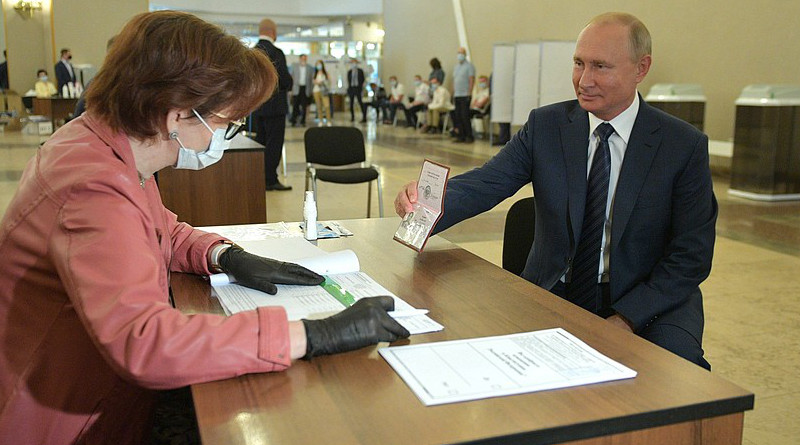Russian Constitutional Referendum Sets A Dangerous Precedent
By Daniel Sixto
Russia’s latest referendum to reform the country’s constitution and allow President Vladimir Putin to run in 2024 highlighted how little the Kremlin cares about legitimate and democratic processes. Putin, following the annexation of Crimea in 2014, resented the effect of US sanctions placed on the Russian economy, leading him to push an increasingly authoritarian rhetoric. He thinks that the United States abused its power on multiple occasions, forcing states like Russia to counter its foreign policy. Doing so requires effective leadership in Moscow, and Putin believes that his presence in the Kremlin remains vital for Russia’s future. Unfortunately, as the most recent referendum highlights, Putin’s alternative system to the US-led order exploits its citizens to maintain an illegitimate regime in power. The referendum will expand executive power considerably, and its resounding passage came only through manipulating voters with a flawed ballot structure and alleged voter fraud on an unprecedented scale.
Extending and Expanding Executive Power
Following a historic referendum to amend the Russian constitution and grant new powers to the executive, Putin could potentially remain in office until 2036. On July 1, the Russian Central Election Commission announced a 78% vote in favor of constitutional reforms, five hours before polls closed. The vote nullified Putin’s previous terms as president, allowing him to run for two more consecutive terms. Putin claimed that allowing him to stay in power increases the Kremlin’s efficacy because, without him, the government would prioritize finding his successor instead of performing its duties. The constitutional reforms additionally granted Putin the power to appoint or dismiss federal judges, which effectively grants him the ability to remove any opposition from the Russian judiciary. Both amendments highlight how the referendum granted Putin control over large swaths of Russian life, funneling more power into a single branch of government.
Despite becoming more authoritarian, Putin’s move could potentially backfire in the future. Concentrating so much power in the hands of one man prevents effective action in localized, regional crises. For example, delivering aid to combat the novel coronavirus and future pandemics in different Russian regions could prove excruciatingly difficult for Putin without local cooperation.
A Packaged Vote
Putin’s referendum exploited Russians in a moment of state-wide financial vulnerability. As Russia continues to battle a steady rise in COVID-19 cases, many financially insecure Russians broke quarantine to vote for vital social aid in the referendum, including pensions and guaranteed minimum wage. Interestingly, the same ballots that outlined the power-grabbing constitutional reforms also packaged social aid legislation into the same vote. Therefore, any vote for pensions also voted to nullify Putin’s previous terms.
Lumping all constitutional reforms into a single vote represents a blatant power-grab on behalf of the Kremlin, indicating the government’s willingness to exploit Russians and only grant them key social aid if they also vote to expand Putin’s tenure. When the Kremlin advertised the referendum, it often emphasized social aid above presidential power reform in the hopes of increasing voter turnout. In addition, the Kremlin entered voting Russians in lotteries to win cash prizes, apartments, cars, and other rewards. As a result, turnout numbers likely increased significantly.
It follows that the Kremlin added social reforms to the constitutional changes in order to increase voter turnout, portray the vote as legitimate, and make the claim that Russians still hold faith in their president. Unfortunately, the Kremlin capitalized on the high turnout numbers by claiming that the vote highlighted the faith that Russians hold in their government. On the contrary, the referendum came at a time when public faith in the Kremlin is actually touching historic low as the pandemic continues to act as a drag on Putin’s approval ratings. The president’s approval rating currently sits at 59%, its lowest point in over ten years; moreover, 52% of Russians expect to receive reduced pay in the coming months.
Unprecedented Ballot Fraud
Russia’s referendum likely experienced mass ballot fraud to help the Kremlin legitimize the vote, potentially setting a precedent for future Russian elections. One electoral researcher claimed that the Central Election Commission falsified around 22.4 million votes, roughly a fourth of the 88 million total votes. When organizing the vote, the Kremlin allowed both early in-person and internet voting for two weeks before July 1, without providing significant oversight. As a result, reports emerged of unusually high amounts of at-home voters in Moscow, likely indicating mass falsification of ballots. In addition, various polling stations held onto ballots overnight with no supervision. The Kremlin tallied 80% of votes by the final voting day, and the lack of oversight has led many independent observers to discredit the referendum. Despite mounting criticism from abroad, the referendum has passed, and Russia now has an updated constitution. As Putin’s approval ratings continue to decline, he may well have reason to utilize the same methods to remain in office in the future.
An Authoritarian Turn in the Future?
July’s referendum foreshadowed an era of increasingly authoritarian measures in Russia. Putin, in hopes of maintaining power, successfully extended his electoral eligibility by exploiting the Russian people amidst the COVID-19 pandemic and allegedly committing mass ballot fraud. The Kremlin set a dangerous precedent with this referendum, indicating a willingness to falsify information and suppress the will of the Russian people to meet its immediate political goals. Failing to account for Russians could potentially backfire, however. If another pandemic or similar crisis reaches Russia and further challenges the public’s trust in their government, Putin’s future could be put to question.
The views expressed in this article are those of the authors alone and do not necessarily reflect those of Geopoliticalmonitor.com or any institutions with which the authors are associated.

